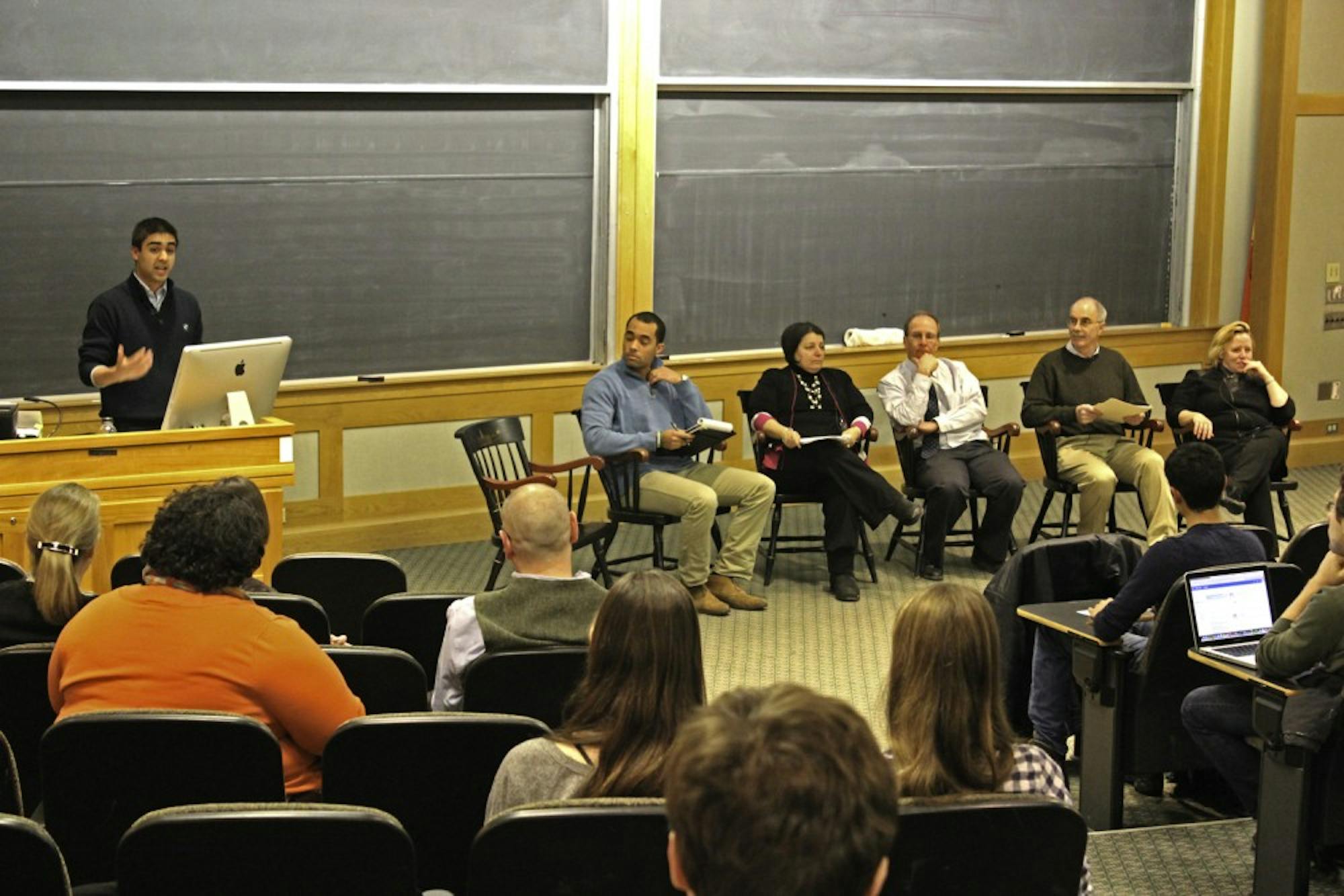Student Assembly, Palaeopitus senior society and the Office of the President hosted a “Moving Dartmouth Forward” town meeting last night in Filene Auditorium, during which a panel composed of College President Phil Hanlon, Interim Dean of the College Inge-Lise Ameer, Provost Carolyn Dever and Dean of the Faculty Michael Mastanduno answered questions from facilitators and audience members about the plan’s five major initiatives.
The event, which lasted about an hour, was facilitated by Palaeopitus member Ashneil Jain ’15 and Student Assembly president Casey Dennis ’15. The facilitators asked panel members questions about proposed changes to residential life, academic rigor, the hard alcohol policy, inclusivity and health and wellness.
During the event, Dever compared the proposed residential community system to the four Hogwarts houses in author J.K. Rowling’s “Harry Potter” series, stating that they will provide an additional layer of identity for students.
Mastanduno said that increasing academic rigor, if done properly, will not lead to increases in student stress levels.
“It’s not a question of going from un-rigorous to rigorous work, but a question of creating more intellectual challenges and engagement in courses to produce a better learning product overall,” he said.
Hanlon said he was pleased with the way the town meeting turned out.
“The students were engaged, they were listening and the questions that they brought up were great,” Hanlon said in a post-event interview with The Dartmouth. “I was talking to some of them before and they earnestly want Dartmouth to be a better place, and that’s the most important thing.”
During the discussion on the campus-wide hard alcohol ban, Ameer said that sanctions will be stiffer for students caught with hard alcohol than those with alcoholic substances under 30 proof. The College will continue to take safety as seriously as it always has, she said, asking students to prioritize student safety over the fear of negative ramifications for hard alcohol possession.
“The Good Samaritan policy is the same on March 28th as it is now — don’t hesitate to call, even if a minor has hard alcohol in their system,” she said.
Palaeopitus member Valerie Zhao ’15 said she hopes that the town hall meeting will provide clarity on the details of “Moving Dartmouth Forward” for students.
“I hope that people will realize how many changes have not yet been determined,” Zhao said. “President Hanlon has a broad vision for Dartmouth, but students will have a major role in how that vision is realized.”
When asked about the possibility of residential communities replacing Greek houses on campus, Hanlon said that he “doesn’t have a hidden agenda” and is not seeking to abolish the Greek system. Hanlon said that his focus is less on the Greek system as a part of the problem and more on it becoming a part of the solution.
“Individual organizations may still be eliminated if they don’t step up to the new standards,” he added.
Dever said she was excited about the sense of kinship that the residential communities will provide for students and about the faculty who have applied to become “house professors.”
“It’s serendipity about who you’re with,” she said. “You know your house as a freshman, and you remain a member of that house as an alumnus.”
Ameer added that residential communities would provide an “anchor” for students amid the constantly changing world of the D-Plan.
Jay Raju ’18, who attended the event, said that the structure of the town meeting did not involve enough student input.
“I thought the questions were outstanding, particularly the ones that were created by the people in the audience and written at the meeting itself,” he said. “I think that having more of those questions rather than follow-up questions by the members who were facilitating the discussion may have been more productive in getting the community’s visions out.”
Regarding his proposal to add earlier class times, Hanlon said that the effort is an attempt to shorten nightly “party periods” and shift student sleep schedules. As an example, Hanlon pointed to making classes begin two hours earlier.
“Probably more healthy activities will take place between 8:30 and 10:30 in the morning rather than between 1:30 and 3:30 in the morning,” he said.
Panel members also added that the College is serious about creating an environment where underrepresented demographics can succeed, and that the steering committee is attempting to emulate the strong health and wellness programs at the University of New Hampshire and the United States Naval Academy.
Raju said that the members of the panel seemed to be frank with their responses and that he was happy with the meeting overall.
“I think that the answers themselves were as a whole very honest, and they didn’t seem to be hiding too much,” he said. “They’re either very good at hiding things or they’re being genuine, and for my own sanity’s sake I choose to believe the latter.”
Jain is a member of The Dartmouth business senior staff.




